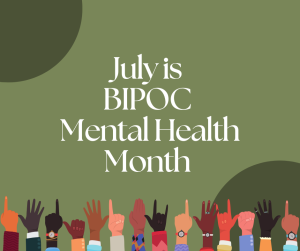BIPOC Mental Health Month
July is BIPOC Mental Health Month. This month is to bring awareness to the unique challenges that racial, ethnic, and sexual marginalized communities face regarding mental illness in the United States. Studies show that these underserved communities show higher levels of anxiety, depression, suicidal tendencies, PTSD, and other mental health disorders.

Nationally, July is the time to acknowledge and explore these issues and to work to destigmatize and enhance public awareness of mental illness among underserved communities in the United States. Society’s deep-rooted prejudice towards these groups is a major cause of feelings of rejection, estrangement, and harassment. Barriers to care include equitable access to care, cultural stigma, and lower quality care all can play a part in affecting the experiences of underserved communities in the US.
What’s the connection with gambling?
Mental Health and gambling go hand in hand. Gambling can cause anxiety, depression, stress, and low self-esteem.
Just like mental health, there is a stigma when it comes to gambling. Gambling is easy to hide, and often referred to as the hidden addiction. People who are experiencing problems due to their gambling often have a large amount of shame as well as fear about the amount of debt they have. It can be difficult to reach out for help as they often feel alone and isolated.
The shame and stigma associated with gambling problems can be further compounded within BIPOC communities. This can be because of a distrust of the medical system, or lack of services for those who are undocumented. In addition, treatment options can be limited for those in underserved communities as service availability may not be equitable, culturally specific or in a client’s native language.
Raising Awareness
Just like mental health services, these communities are underserved when it comes to gambling services. It is important to continue to have these conversations and to advocate for resources for those who are part of these populations. Reach out to your local Problem Gambling Resource Center to identify what resources are currently available, what is missing, and to work in collaboration so that we can better serve our communities.
There are many resources we would like to highlight during BIPOC Mental Health Month. Check them out below and see how you can participate.
Office of Diversity and Inclusion Resources
The Hidden Addiction Podcast: Addressing Disparities of the BIPOC Community
Getting Help
As always, the New York State Problem Gambling Resources are here to help. If gambling is impacting you or your family, visit NYProblemGamblingHELP.org to find the resource center closest to you.
